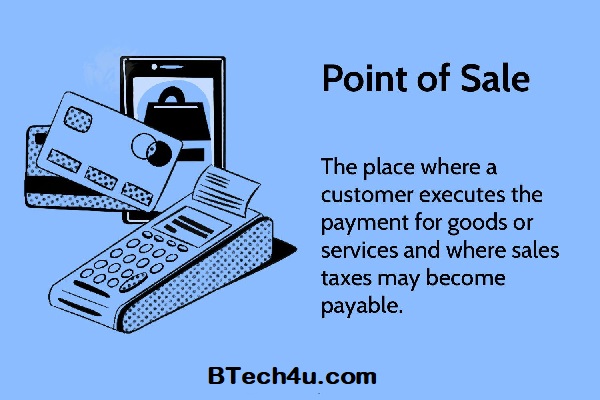Do you know about how Point of Sale (POS) System is helping boost Sales? In today’s dynamic business environment, where customer expectations are soaring, businesses are constantly seeking innovative solutions to boost efficiency and drive sales. One technology that has emerged as a game-changer in achieving these goals is the Point of Sale (POS) system. A powerful tool that revolutionizes the way businesses process transactions, manage inventory, and interact with customers, POS systems have become instrumental in streamlining operations, optimizing resources, and ultimately maximizing growth.
Streamlining Transactions for Enhanced Efficiency:
Gone are the days of manual cash registers and handwritten receipts. With a POS system in place, businesses can process transactions quickly, accurately, and efficiently. These systems are designed to handle the entire process seamlessly, from scanning products and calculating prices to accepting various payment methods. By automating these tasks, businesses can significantly reduce transaction times, eliminate manual errors, and ensure smoother customer interactions. The result is a more efficient and streamlined checkout experience that improves customer satisfaction and enhances overall operational efficiency.
Efficient Inventory Management:
POS systems offer robust inventory management features that empower businesses to effectively track, monitor, and optimize their inventory levels. Real-time inventory tracking capabilities enable businesses to know exactly what products are available in stock, preventing stock outs or overstocking. Automated alerts for low stock levels ensure timely reordering, reducing the risk of lost sales due to product unavailability. Moreover, advanced POS systems can generate comprehensive reports on inventory turnover, popular products, and seasonal trends, helping businesses make informed decisions regarding purchasing, stocking, and strategies. This level of visibility and control over inventory translates into improved efficiency, minimized costs, and increased profitability.
Data-Driven Decision Making:
POS systems provide businesses with access to valuable sales data and analytics. These systems can generate comprehensive reports on various aspects of performance, such as top-selling products, peak periods, and customer buying patterns. By leveraging this data, businesses can gain insights into consumer preferences, identify market trends, and adjust their strategies accordingly. For instance, a business can identify which products are performing well and focus on promoting them further to maximize sales. Additionally, POS systems can integrate with customer relationship management (CRM) software, allowing businesses to capture and analyze customer data, personalize interactions, and foster long-term customer loyalty.
Benefits:
Streamlined Transaction Processing: POS systems automate and streamline the entire sales process, from scanning products to accepting payments. This reduces transaction times, eliminates manual errors, and enhances the overall checkout experience for customers, leading to increased efficiency and customer satisfaction.
Accurate Inventory Management: POS systems provide real-time inventory tracking, allowing businesses to have a clear view of stock levels. This helps in preventing stock outs, optimizing inventory levels, and reducing carrying costs. With accurate inventory data, businesses can make informed purchasing decisions, improve order fulfillment, and avoid overstocking or shortages.
Sales Analytics and Reporting: POS systems generate comprehensive reports on sales performance, customer behavior, and product trends. This valuable data enables businesses to analyze sales patterns, identify top-selling items, and make data-driven decisions to optimize sales strategies. With sales analytics, businesses can effectively target promotions, adjust pricing strategies, and focus on high-demand products, ultimately driving sales growth.
Efficient Employee Management: POS systems often include employee management features such as time tracking, shift scheduling, and performance tracking. These features streamline employee management processes, enhance productivity, and help businesses efficiently allocate resources to meet customer demands.
Enhanced Customer Relationship Management: POS systems integrate with customer databases, allowing businesses to capture and store customer information. This enables personalized interactions, targeted marketing campaigns, and loyalty programs, fostering stronger customer relationships and driving repeat business.
Key Features of POS Systems:
Transaction Processing: POS systems facilitate quick and accurate transaction processing, accepting various payment methods such as cash, credit/debit cards, and digital wallets.
Inventory Management: POS systems provide real-time inventory tracking, inventory alerts, and automatic reordering functionalities to streamline inventory management and prevent stockouts.
Reporting and Analytics: POS systems generate detailed reports on sales performance, inventory levels, customer behavior, and other key metrics, empowering businesses to make data-driven decisions.
Integration Capabilities: POS systems can integrate with other business tools and software such as accounting systems, e-commerce platforms, and CRM software, allowing seamless data exchange and streamlined operations.
Customer Relationship Management: POS systems capture and store customer information, enabling businesses to personalize interactions, implement loyalty programs, and provide targeted promotions.
Employee Management: Some POS systems include features for time tracking, shift scheduling, and performance monitoring, helping businesses effectively manage their workforce.
Scalability: POS systems are scalable, allowing businesses to adapt and expand as their needs evolve, whether it’s adding new locations or accommodating increased sales volume.
Enhanced Customer Experience:
Delivering exceptional customer experiences is crucial for business success. POS systems play a pivotal role in achieving this goal by enabling businesses to offer personalized services, quick and accurate transactions, and efficient customer support. With a POS system, businesses can access customer information and purchase history instantly, allowing them to provide tailored recommendations, loyalty rewards, and targeted promotions. Moreover, the integration of customer-facing displays or self-service kiosks within the POS system enhances the customer experience by enabling self-checkout options, reducing wait times, and empowering customers with greater control over their shopping experience.
Case Study #1:
A Small Boutique Store A small boutique store in a busy shopping district was struggling to keep track of inventory and sales. They decided to implement a cloud-based POS system that allowed them to track inventory in real-time and process transactions quickly and easily. As a result, they were able to reduce the amount of time spent on manual inventory tracking and increase their sales by 25% in the first year.
Case Study #2:
A Restaurant Chain A restaurant chain with multiple locations was having difficulty managing its operations and keeping track of orders. They implemented a POS system that allowed them to centralize their order management and track products and sales data across all locations. This helped them to streamline their operations and improve customer satisfaction by reducing wait times and errors in orders.
Case Study #3:
A Specialty Retailer A specialty retailer was struggling to keep up with customer demand for online sales. They implemented an e-commerce platform that integrated with their POS system, allowing them to manage inventory and process orders in real-time. This helped them to increase their online sales by 50% and improve customer satisfaction by offering faster and more accurate order processing.
You may also like: 10 Importance Of Technology In Education
Case Study #4:
A Service-Based Business A service-based business was having difficulty managing its appointments and scheduling. They implemented a POS system that allowed them to manage appointments and process payments in real time. This helped them to improve customer satisfaction by offering a more convenient and streamlined booking process, and also helped to reduce no-shows and late cancellations.
Pros:
Streamlined transactions: A POS system enables businesses to process transactions quickly and efficiently, reducing waiting times and enhancing the overall customer experience.
Inventory management: POS systems can track inventory levels in real-time, providing businesses with accurate insights into stock availability, helping avoid stock outs and optimize inventory management.
Sales analytics: POS systems offer robust reporting and analytics capabilities, providing businesses with valuable data on sales trends, popular products, and customer behavior. This data can be used to make informed business decisions and develop effective sales strategies.
Improved accuracy: With a POS system, manual errors in pricing, calculations, and inventory tracking can be significantly reduced, ensuring accurate transaction records and preventing financial discrepancies.
Enhanced customer service: POS systems enable businesses to access customer information quickly, allowing personalized interactions, targeted promotions, and better customer service overall.
Cons:
Cost: Implementing a POS system may involve upfront costs, including hardware, software, and ongoing fees for maintenance and support. Small businesses with limited budgets may need to carefully evaluate the return on investment.
Learning curve: Learning to use a new POS system may require training and adjustment for staff members. The initial learning curve can affect efficiency temporarily until everyone becomes familiar with the system.
Technical issues: Like any technology, POS systems can experience technical glitches or downtime, which can disrupt operations and potentially affect sales. Businesses should have contingency plans in place to mitigate these risks.
Compatibility and integration: Integrating a new POS system with existing business systems, such as accounting or inventory management software, may require additional time, effort, and potential technical challenges.
Data security: POS systems handle sensitive customer information and financial data, making data security a critical concern. Businesses must prioritize cybersecurity measures and ensure compliance with data protection regulations to safeguard customer information.
FAQs:
Q1: What is a POS system?
A: A POS (Point of Sale) system is a technology solution that allows businesses to process transactions, manage inventory, track sales, and perform various other functions related to sales and customer transactions.
Q2: How does a POS system help boost efficiency in businesses?
A: A POS system helps boost efficiency in businesses by streamlining transaction processing, reducing manual errors, providing real-time inventory tracking, generating sales reports, and enabling faster customer service, leading to improved overall operations.
Q3: Can a POS system help businesses increase sales?
A: Yes, a POS system can help businesses increase sales. It provides valuable insights into sales trends, customer preferences, and popular products, allowing businesses to make data-driven decisions, offer personalized experiences, and optimize sales strategies for better results.
Q4: What features should I look for in a POS system to enhance efficiency?
A: Some key features to consider in a POS system for enhancing efficiency include fast transaction processing, inventory management capabilities, sales analytics and reporting, integration with other business systems, and user-friendly interfaces for smooth operations.
Q5: Will implementing a POS system require extensive staff training?
A: While some training may be necessary, modern POS systems are designed to be user-friendly and intuitive. The level of training required depends on the complexity of the system and the familiarity of the staff with technology. Many POS providers offer training and support resources to facilitate the implementation process.
Conclusion Point of Sale (POS) System:
The adoption of a Point of Sale (POS) system has proven to be instrumental in helping businesses boost efficiency and sales. By streamlining transactions, improving inventory management, providing sales analytics, enhancing accuracy, and elevating customer service, POS systems offer numerous benefits to businesses of all sizes. One of the key advantages of POS systems is their ability to streamline transactions, enabling businesses to process sales quickly and efficiently. This not only reduces waiting times for customers but also enhances their overall experience, leading to higher customer satisfaction and potentially increased sales. Visit BTech






Add comment